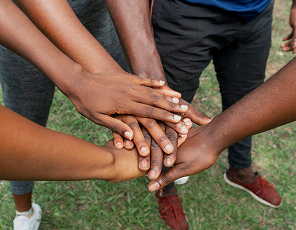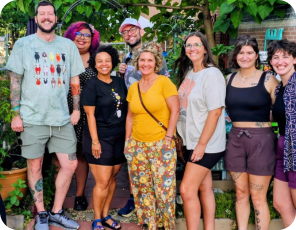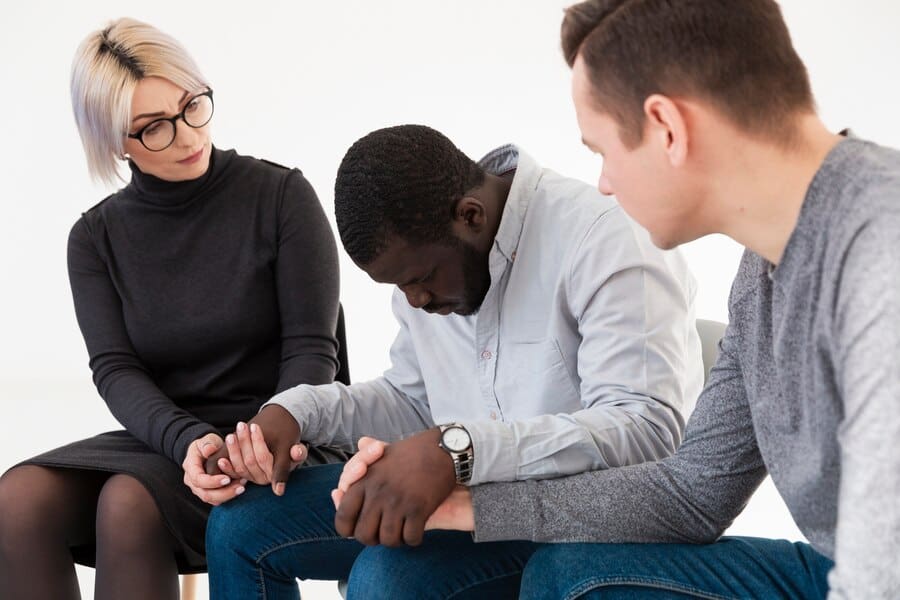In our diverse and interconnected world, it is crucial to recognize the importance of empowering Individuals who identify as BIPOC (Black, Indigenous, and People of Color) their path to healing. Healing encompasses physical well-being and mental, emotional, and spiritual wellness. By understanding and addressing the unique experiences and challenges faced by BIPOC communities, we can work towards dismantling systemic barriers and fostering environments that promote healing, resilience, and empowerment. Join us as we delve into the journey of empowering BIPOC individuals and embracing their voices, stories, and transformative potential.
Importance Of Empowering BIPOC Individuals
Empowering BIPOC (Black, Indigenous, and People of Color) individuals holds immense significance today. Here are some key reasons why empowering BIPOC individuals is crucial:
- Overcoming Historical Injustices: BIPOC communities have endured centuries of systemic racism, oppression, and marginalization. Empowerment provides an opportunity to heal from historical trauma and try to make society more just and equal.
- Mental Health and Well-being: Racism and discrimination profoundly impact the mental health of BIPOC individuals. Empowerment promotes self-advocacy, resilience, and self-care practices, aiding in healing trauma and promoting overall well-being.
- Amplifying Voices and Perspectives: Empowering BIPOC individuals means creating space for their voices, stories, and perspectives to be heard and valued. This leads to a richer and more inclusive society that acknowledges and appreciates all its members’ diverse experiences and contributions.
- Breaking Down Barriers: Empowerment helps dismantle the barriers that hinder BIPOC individuals from achieving their full potential. Empowerment opens doors for education, career advancement, and socioeconomic progress by addressing systemic inequities and providing equal opportunities.
- Building Stronger Communities: When BIPOC individuals are empowered, it strengthens the entire community. Empowerment fosters unity, collaboration, and support networks that promote collective healing, resilience, and positive social change.
- Inspiring Future Generations: Empowering BIPOC individuals creates a ripple effect that inspires and uplifts future generations. By providing positive role models, mentorship, and educational opportunities, empowerment instills hope, ambition, and a sense of possibility in young BIPOC individuals.
Understanding The BIPOC Experience
To truly empower BIPOC (Black, Indigenous, and People of Color) individuals on their path to healing, it is essential to understand their unique experiences within the broader societal context. The BIPOC experience encompasses a complex interplay of historical, social, and systemic factors that profoundly affect individuals and communities. Here are vital aspects to consider when seeking to understand the BIPOC experience:
- Historical Context: The BIPOC experience is rooted in a history of colonization, slavery, genocide, and forced assimilation. Understanding the historical injustices and traumas inflicted upon BIPOC communities is crucial in comprehending their current struggles and disparities.
- Systemic Oppression: BIPOC individuals face systemic racism and oppression across various aspects of life, including education, employment, housing, healthcare, and criminal justice systems. These systems perpetuate inequalities and limit opportunities, resulting in marginalized experiences for BIPOC individuals.
- Intersectionality: Intersectionality recognizes that the intersection of multiple identities, such as race, gender, ethnicity, sexuality, and socioeconomic status shapes an individual’s experiences. The BIPOC experience is not monolithic, as individuals may face different forms of discrimination and varying levels of privilege within and outside their communities.
- Impact on Mental Health: Racism and discrimination harm the mental health and well-being of BIPOC individuals. Constant exposure to racial bias, microaggressions, and systemic inequalities can lead to heightened stress, anxiety, depression, and trauma.
- Cultural Resilience and Heritage: Despite their challenges, BIPOC communities often draw strength from their cultural resilience, traditions, and heritage. Recognizing and celebrating diverse cultural practices and narratives is crucial in fostering a sense of identity, pride, and empowerment.
- Community Support and Activism: BIPOC communities have a long history of community support, solidarity, and activism. Understanding the collective efforts to challenge and dismantle systemic oppression helps appreciate the resilience and strength exhibited by BIPOC individuals.
Breaking Down Barriers To Healing
To empower BIPOC (Black, Indigenous, and People of Color) individuals on their path to healing, it is essential to identify and break down the barriers that hinder their well-being. Here are critical obstacles to recovery that need to be addressed:
- Acknowledging and Addressing Trauma: Addressing trauma is crucial for empowering BIPOC individuals, as it impacts generations and requires intergenerational interventions.
- Challenging Stigmas Surrounding mental health: Creating supportive environments for BIPOC individuals by challenging stigmas, promoting open dialogue, and improving access to culturally sensitive mental health services.
- Healing from Racial Trauma: Racial trauma impacts BIPOC mental health; creating trauma-informed spaces, resilience, and coping mechanisms are crucial.
- Culturally Relevant Healing Approaches: Culturally relevant healing approaches support BIPOC individuals’ journey, enhancing interventions’ effectiveness and building trust in inclusive environments.
- Empowering Self-Care and Self-Compassion: BIPOC individuals need self-care, self-compassion, mindfulness, exercise, nutrition, and holistic healing to manage stress, anxiety, and trauma.
Promoting Self-Care and Self-Compassion
Promoting self-care and self-compassion is crucial to empowering BIPOC (Black, Indigenous, and People of Color) people on their path to healing. Here are key strategies and practices to encourage self-care and self-compassion within the BIPOC community:
 Mindfulness and Meditation: Promote mindfulness and meditation for grounding, relaxation, and self-reflection, fostering self-awareness, stress management, and emotional resilience in BIPOC individuals.
Mindfulness and Meditation: Promote mindfulness and meditation for grounding, relaxation, and self-reflection, fostering self-awareness, stress management, and emotional resilience in BIPOC individuals.- Physical Well-being: Promote physical self-care, including exercise, diet, and sleep, to promote overall well-being and healing for the BIPOC community. Engage in culturally relevant activities, such as dance and traditional movement practices.
- Cultivating Self-Compassion: Encourage self-compassion by treating oneself with kindness, understanding, and acceptance, acknowledging struggles, and using techniques like positive self-talk and affirmations. Remind BIPOC individuals of their validity and prioritize their well-being.
- Creating Safe Spaces: Create safe, supportive spaces for BIPOC individuals to discuss experiences, seek support, and engage in healing activities. Ensure inclusive, judgment-free, and respect diverse experiences, valuing individual journeys for self-care and compassion.
- Seeking Professional Support: Promote BIPOC individuals seeking professional mental health support, identifying culturally competent therapists and practitioners, emphasizing self-empowerment, and normalizing therapy and counseling as valuable resources for healing and growth.
Building Supportive Communities
Building supportive communities is crucial in empowering BIPOC (Black, Indigenous, and People of Color) individuals on their path to healing. Here are key strategies and approaches to foster supportive communities:
- Creating Safe Spaces: Create safe spaces for BIPOC individuals to share experiences, express emotions, and find validation, promoting inclusivity and respect through physical locations, online platforms, and community organizations.
- Cultivating Peer Support: Promote peer support and solidarity among BIPOC individuals through connections, support networks, and community events.
- Celebrating Diverse Voices and Experiences: Promote diverse voices in the BIPOC community through platforms like blog features, podcasts, and community events, showcasing rich BIPOC cultures and traditions, and celebrating heritage months.
- Establishing Culturally Sensitive Support Services: Create culturally sensitive support services for BIPOC individuals, train mental health professionals, and collaborate with community organizations for accessible, affordable mental health support.
- Mentorship and Role Modeling: Promote mentorship programs connecting BIPOC individuals with guidance, support, and growth opportunities, serving as role models, and promoting representation in leadership roles.
- Advocacy and Activism: Advocate for systemic racism, equity, and social justice by collaborating with community organizations, attending protests, supporting policy reforms, and encouraging grassroots involvement in decision-making.
Empowering BIPOC Youth
Empowering BIPOC (Black, Indigenous, and People of Color) youth is paramount as they are future leaders and changemakers. Here are key strategies to empower and support BIPOC youth:
 Education and Mentorship: Offer quality education, celebrate diversity, and promote identity in diverse learning environments. Establish mentorship programs for BIPOC youth, offering guidance, support, and career advice.
Education and Mentorship: Offer quality education, celebrate diversity, and promote identity in diverse learning environments. Establish mentorship programs for BIPOC youth, offering guidance, support, and career advice.- Building Self-Esteem and Confidence: Create a supportive environment for BIPOC youth to embrace their cultural heritage, unique identities, and pride, celebrate achievements, develop skills, and build self-confidence through extracurricular activities and leadership programs.
- Cultivating Leadership Skills: Offer BIPOC youth leadership development programs focusing on communication, critical thinking, problem-solving, and community engagement, encouraging them to take leadership roles.
- Mental Health and Well-being: Prioritize BIPOC youth’s mental health by offering culturally competent services, addressing stigma, promoting open conversations, creating safe spaces, and offering resources for self-care practices.
- Advocacy and Civic Engagement: Encourage BIPOC youth to engage in advocacy and civic engagement through community projects, volunteering, and social justice campaigns. Empower them to use their voices, promote civic education, and influence positive change.
- Networking and Community Connections: Encourage networking for BIPOC youth, promote skill-building through conferences, workshops, and events, and support youth-led organizations for collaboration and community empowerment.
Advocating for Systemic Change
Advocating for systemic change is critical in empowering individuals and communities identifying as BIPOC (Black, Indigenous, and People of Color). Here are essential strategies for advocating for systemic change:
- Education and Awareness: Encourage education and awareness on systemic racism, inequality, and social justice issues, sharing resources, and encouraging open conversations to foster understanding and empathy.
- Grassroots Organizing and Activism: Participate in grassroots organizing to challenge systemic racism, raise awareness, and work with community organizations to dismantle barriers.
- Allyship and Solidarity: Advocate for BIPOC individuals and communities, promoting inclusivity and challenging discriminatory practices. Learn from leaders, activists, and community organizers for systemic change.
- Policy and Legislative Advocacy: Advocate for policy reforms at local, regional, and national levels to address systemic inequalities, support organizations promoting racial and social justice, and donate or volunteer.
- Corporate and Institutional Accountability: Advocate for diversity, equity, and inclusion in the workplace, challenge discriminatory practices, promote transparency, and prioritize initiatives like anti-racist training.
- Voting and Civic Engagement: Promote voting rights, engage BIPOC communities, and advocate for fair practices, including addressing voter suppression efforts and supporting initiatives for voting access and representation.
In conclusion, empowering BIPOC (Black, Indigenous, and People of Color) individuals on their path to healing and promoting systemic change are essential for creating a more equitable and inclusive society. By acknowledging and addressing the barriers to recovery, fostering supportive communities, advocating for systemic change, and prioritizing self-care and self-compassion, we can uplift and empower BIPOC individuals to thrive. Let us join hands and continue the journey toward justice, healing, and empowerment. If you have any questions or want to get involved, please contact us today at (828) 515-1246. Together, we can make a difference.







